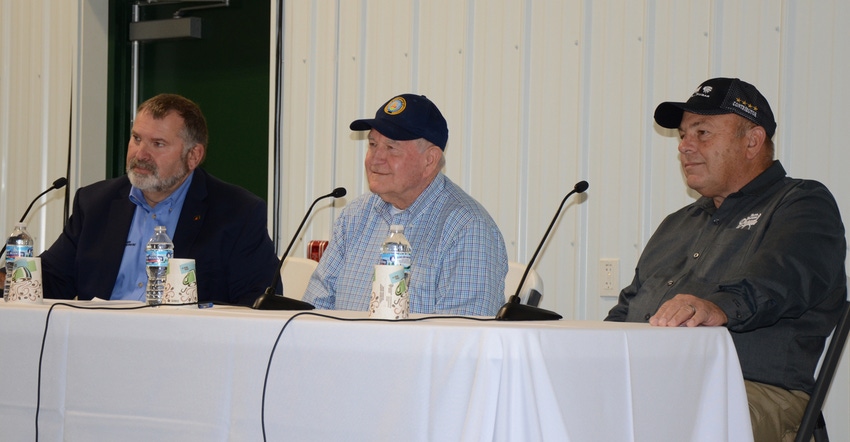
U.S. Department of Agriculture Secretary Sonny Perdue says wherever he goes, he hears most about trade, labor and regulation.
A stop in Michigan for a town hall meeting Sept. 26 was no different.
International trade with Japan and China and the status of the U.S.-Mexico-Canada Agreement (USMCA), which has not yet passed Congress, were the main points of discussion at Michigan State University’s Saginaw Valley Research and Extension Center in Frankenmuth, Mich.
It was the first of three stops that day in the state, including visits to Summer Dreams Farms, a fresh-cut flower farm, and Better Made Snack Foods.
In front of about 300 farmers and industry leaders, Perdue entertained questions and gathered information he said he would take back to President Donald Trump. He was flanked on each side of a head table by Michigan Farm Bureau President Carl Bednarski, who moderated the meeting, and Zippy Duvall, president of the American Farm Bureau Federation, who also answered questions.
“The world is watching,” Perdue said about USMCA. “If we cannot get an agreement with people on the north and south of us, how can we have an agreement with the world on trade?”
He didn’t even like to contemplate USMCA not passing. “It’s an evil thought,” said Perdue, who urged everyone in the industry to be vocal advocates for its passage and to contact lawmakers.
For Michigan and Wisconsin, in particular, he said USMCA will provide a dairy improvement with Class 7 milk. “There was a real holdover in Canada,” he said. “They had circumvented the rules there, allowed to oversupply in their dairy management. That oversupply depressed the milk prices and milk solid prices in the U.S. and worldwide.”
Perdue also said USMCA provides access to Canada’s dairy, poultry and eggs and the end to unfair grading on wheat from the Northern Plains. “U.S. wheat was being graded as feed wheat,” he said.
His fear is that lawmakers are getting distracted by other issues or things “like Russia, Ukraine, and I sure hope it’s not caught in presidential politics. It’s like a political scavenger hunt out here.”
Some people may find out the deal is not perfect, he said. “I don’t want perfect to get in the way of a very good agreement. Good overall for agriculture and the rest of the economy.”
Most of the concern he’s heard with USMCA is over enforceability. “Can you trust the Mexicans to live up to it?” Perdue said. “What the world is finding out, they have an administration in the United States of America that is pretty serious about enforceability.”
Perdue said he’s optimistic about USMCA. “I would challenge anyone to look at that agreement and read it, compared to where we were with NAFTA, and tell me we’re not better,” he said. “Chapter by chapter, verse by verse, line by line, [it’s better] than the agreement we had.”

TART CHERRY CONCERN: Nels Veliquette, a cherry grower and chief financial officer of Cherries R Us and Cherry Ke. Inc., asked about the timing of some relief for tart cherry growers after recently winning anti-dumping and counterveiling duties against Turkey.

Moving on to trade talk with China and the tariffs, Perdue said it was in China’s court, after a deal was close in April but fell through after Chinese officials returned home.
“China’s economy is hurting. I think they are in trouble,” Perdue said, while noting that China has made some recent purchases of pork and soybeans.
Negotiations are coming back to the U.S. in October.
He also praised the recent trade deal with Japan that when implemented, will enable American producers to compete more effectively with countries that currently have preferential tariffs in the Japanese market.
According to USDA, Japan imported $14.1 billion in U.S. food and agricultural products in 2018 — $5.2 billion was already duty-free. Under this first-stage initial tariff agreement, Japan will eliminate or reduce tariffs on an additional $7.2 billion of U.S. food and agricultural products.
Other questions from the audience spanned from biofuels and help with prevented planting to crop insurance and climate change.
Nels Veliquette, a cherry grower and chief financial officer of Cherries R Us and Cherry Ke. Inc., asked about the timing of some relief for tart cherry growers after recently winning anti-dumping and counterveiling duties against Turkey for dumping dried tart cherries on the U.S. market.
Perdue applauded the decision, but said that relief will not likely come quickly, with legal appeals to follow. “The award will be based on damage to the industry. Unfortunately, it won’t be in 2019,” Perdue said. “I think these people are going to be rewarded for bringing that case and demonstrating the damage that’s been done.”
To slow the flow of cheap Turkish cherries into the U.S., the government will charge a 541.29% tariff to most Turkish exporters, while two others will be charged 648.35%.
The Department of Commerce is currently scheduled to announce its final determinations on the matter in December.
Before the meeting, Perdue visited Laracha Farms near Reese, Mich., and rode in a sugarbeet harvester with Charlie Bauer.
It is his third visit to Michigan since being appointed secretary.
About the Author(s)
You May Also Like






